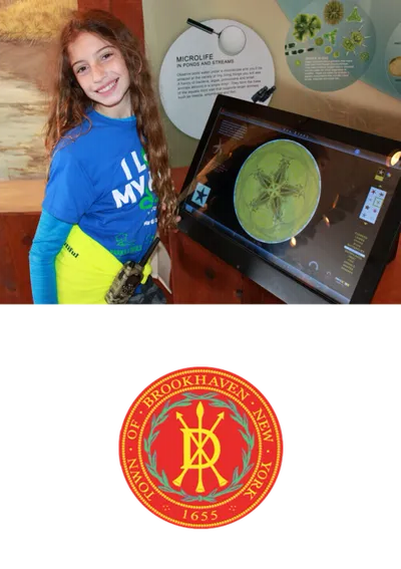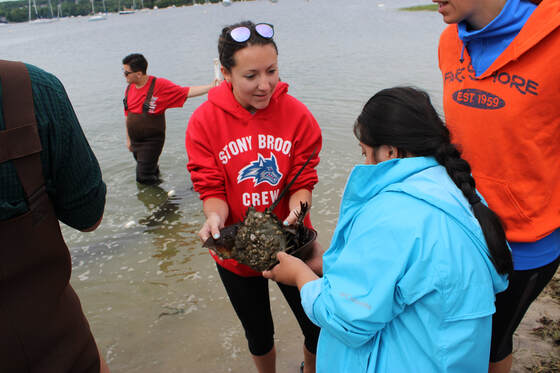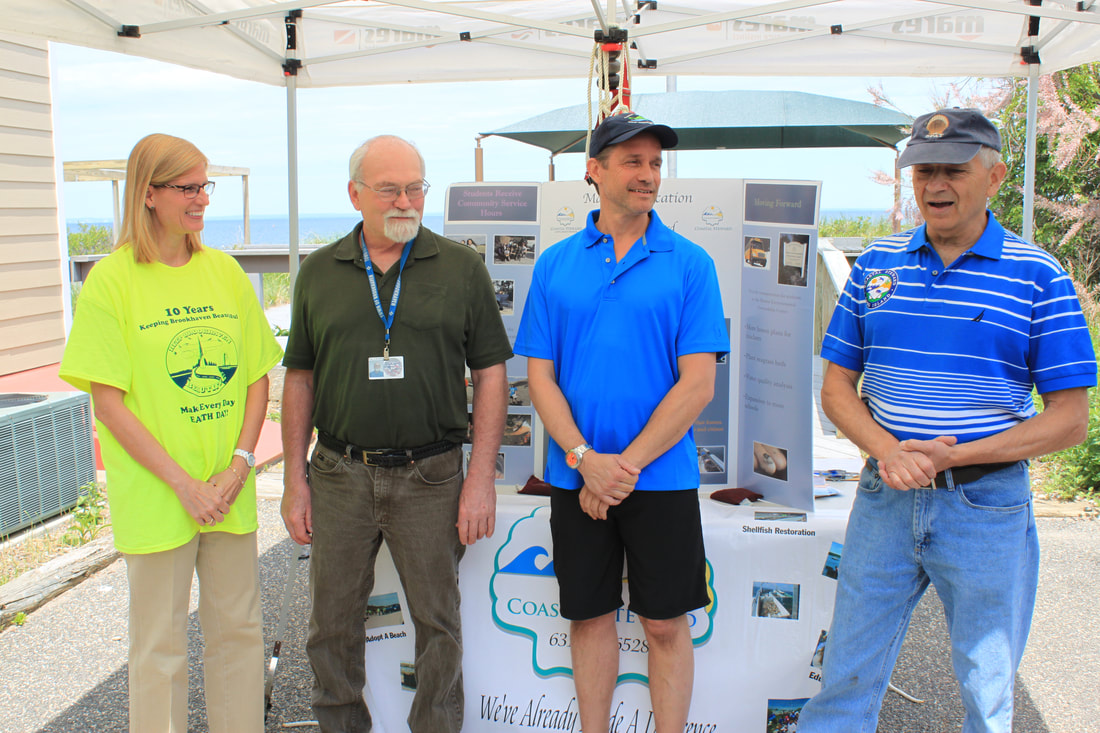Coastal Steward Long Island
Menu
Education
Marine EducationYouth Education Programs
Our goal is to educate the public about critical marine issues, so we can develop a local community of stewards of all ages who will protect our waterways and ocean on Long Island for years to come. By engaging with our local youth, we foster a caring connection between children and their coastal environment, creating future generations of coastal stewards. We offer free field trips to the Marine Environmental Stewardship Center (MESC) in cooperation with the Town of Brookhaven, where students can learn about Long Island ecology through hands-on study, as outlined below. The center is home to touch-screen technology along with outdoor touch tanks, allowing students to gain first-hand comprehensive experience for learning about the marine environment. CSLI also hosts the Long Island Youth Ocean Conservation Summit each year in the Fall. The Summit is a day full of opportunities for attendees to meet representatives from ocean conservation organizations, listen to presentations, and develop their own conservation action plans. |
Marine Education Programs
The following programs will be available for school groups:
Grades PreK - 6:
(Teachers may select 3 stations from the list below. All programs comply with the New York State Science Learning Standards)
(Teachers may select 3 stations from the list below. All programs comply with the New York State Science Learning Standards)
- Harbor Seining and Marsh Exploration: Students and/or educators, depending on age of students, will use seine nets to collect and identify marine organisms found in Mount Sinai Harbor. Students will have the opportunity to get their hands wet during this program; waders will be provided. While some students use waders to seine, others will use hand shovels and sieves to dig deeper into benthic marine life.
- Shellfish Hatchery Tour: Visit the Town of Brookhaven Shellfish Facility and learn how shellfish are raised from seed and grow into adult shellfish, and how shellfish help improve and restore water quality in the harbor.
- Water Quality Analysis: Students will study the characteristics of water, including temperature, salinity, dissolved oxygen, turbidity, and other existing nutrients. Water is collected from the harbor, and we will compare it with water from the Long Island Sound and also freshwater to determine similarities and differences. Water chemistry and ocean acidification will also be introduced.
- Plankton Microbiology: (Previous microscope experience required. Recommended for grades 4+): Take a closer look at the microscopic marine organisms! Learn about the different types of plankton that exist in the harbor, including phytoplankton, zooplankton, and juvenile marine organisms. Learn how plankton forms the foundation of the marine food web, but also is important to large marine mammals like whales, too!
- Shellfish Anatomy and Dissection: (Recommend for grades 4+) Learn about what's under the shell of an oyster and clam by getting an up-close look at the internal anatomy of a shellfish. These shelled organisms are known ‘filter-feeders’ due to their unique ability to remove and consume, or “filter”, particles (mostly plankton) from the water column. Even though shellfish have very different processes than most other animals, they still have a mouth, heart, stomach, and muscles that function similar to humans.
- Seashore Scavenger Hunt & Plastic Pollution: Students will search Cedar Beach on the north side of the MESC to find both natural treasures and examples of marine debris and pollution that can be found on beaches. Provide check-list of items commonly found on the beach and learn about why and how it got there. Students will be introduced to the impacts of pollution on marine life and how recycling can help keep these items from entering our natural environments.
- History of the Harbor: Journey through the history of Mount Sinai Harbor, beginning with the glaciation that carved the shores of Long Island and that establish land available for habitation. Archeology is introduced to students and how we learn about the Native Americans that lived here for thousands of years before European settlers began keeping records. Students will compare the changes that have taken place since early 1600s settlement through modern-day.
- Boardwalk Vegetation Exploration: Take a stroll through the MESC Nature Walk to learn about the plants that can be found in coastal habitats and the traits of these coastal plants that help them survive. An introduction to the functions these plants provide to not only local land animals, but also to coastal resiliency. Students will take field notes by recording and drawing their observations.
- Virtual Interactive Tour at MESC: Discover Long Island marine life through indoor exhibits, such as interactive touch screens, simulated touch screen submarines, salt water aquariums with live native marine life, and more. Learn about the different habitats that are found around the MESC and record data observations.
|
Grades 7-12:
*Prior knowledge of the use of microscopes is required. Each of these programs will be offered at the Marine Environmental Stewardship Center in Mount Sinai. If you are interested in our programs, please contact us for more information and registration details. |
MESC Photo Gallery
|
|
Lesson Plans
If you are an Elementary School teacher, please download the guide below.
In it you will find:
In it you will find:
- Information about the Marine Environmental Stewardship Center
- Descriptions of the programs offered and the NYS Learning Standards they comply with.
- 5 pre-visit lesson plans to go over with your class before visiting the MESC
- Evaluation forms
Field Trip Planning Guide: Elementary Education
In addition to our education programs, CSLI has created and gathered over 100 lesson plans to help children learn about marine environmental issues, ecology, anatomy, oceanography, and much more.
To view our lesson plans, click on one of the categories below:
In addition to our education programs, CSLI has created and gathered over 100 lesson plans to help children learn about marine environmental issues, ecology, anatomy, oceanography, and much more.
To view our lesson plans, click on one of the categories below:
Public OutreachBefore each beach cleanup, we provide a talk discussing the threats posed to wildlife from the many household items we use on a daily basis that often end up as litter on our beaches. Similarly, garbage left in our roadways ends up in storm drains, ultimately leading back to the ocean. It is our mission to prevent pollution, both on and off the sand.
In our Shellfish Restoration Program, we help to educate the public about the lifecycle of oysters, and the process we use for growing and seeding oysters in our local harbors to regenerate their populations. Our knowledgeable staff will walk you through any questions you may have, and illuminate how shellfish play a vital role in our marine ecosystem. |
© Coastal Steward Long Island. All rights reserved.



